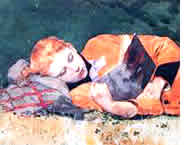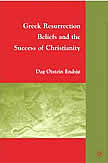| |||||||||||||||||||||||||||||||||
| Getting Started | |||
| Scholars argue> | Yes | No | Jesus Theories |
| Facts > | Sourcebook Anthologies | Sourcebooks: ancient texts | |
| Background > | Ancient Civilization | Ancient Religion | Early Christianity |
| Special topics | Mystery Religions | Ancient Judaism | |
| Amateur > | Pagan Origins | Hablo Greek-o | |
| Yes! |
I'm not the only person who recognizes Christianities pagan origins. Here are academics who say the same thing. Notice that nowadays, rather than write books with grand, sweeping claims about Pagan origins (a la POCM!) academics generally write in depth about one particular subject: Miracles. Divine birth. Homeric Mimesis. Like that. |
| The River
Of God
|
What you'll find:
If this book had been around in 1998, POCM would have been unnecessary.
|
|
|
|
Gospel Fictions
|
What you'll find:
|
|
|
| Documents
For The Study Of The Gospels
|
What you'll find:
Think of this as POCM's blue
boxes in a book, without Greg's annoying commentary.
|
| |
| Greek Resurrection
Beliefs and the Success of Christianity
|
What you'll find:
Endsjo is a professional academic who for years heard and believed the regulation academic myth: The Christian theology of BODILY resurrection was new and unique. It could not have borrowed from Pagan ideas, because to Greco-Roman Paganism the body was corrupt. Eventually Endsjo decided to look at, you know, the ancient evidence. Oops. Turns out bodily resurrection was a widespread belief in pre-Christian Pagan and Jewish culture.
|
| |
| The Historical
Jesus in Context
|
What you'll find:
|
| |
|
The Homeric Epic and the Gospel of Mark
|
What you'll find:
Sound nutty? Yes it does. Which is why the professor supports his thesis with oodles of ancient evidence, and a meticulous, rigorous reasoning. There's so much evidence, it's can be tough to keep going. You may well groan, "Enough already, you've convinced me!"
|
| |
|
Life After Death by Alan Segal
|
What you'll find:
|
| |
| Born Divine
|
What you'll find:
|
| |
| Martyrdom
and Noble Death
|
What you'll find:
|
| |
Miracles
in Greco-Roman Antiquity
|
Lousy with miracles Like chocolate chips in mama's cookies, miracles were a basic ingredient in ancient people's understanding of how the world works. Every bite—another miracle. The ancient world was lousy with miracles. Don't believe me, believe the ancients. This excellent sourcebook gives hundreds of examples—250 pages—of ancient miracles recorded by the pens of ancients themselves. You'll read short excerpts from ancient texts describing Pagan Gods who healed the sick (blindness, paralysis, lameness), raised the dead, exorcised demons, controlled nature, turned water into wine, walked on water, calmed storms, and more. Well organized, easy to read. Highly recommended.
|
| |
| Old
Testament Parallels  |
What
you'll find:
There are lots of books like this to choose from. This is one of the clearest, most readable, and most comprehensive. Highly recommended.
|
| |
|
The Ancient Near East, Volume II)
Ancient Near East in Pictures Relating to the
Old Testament. With Supplement
Ancient Near Eastern Texts Relating to the Old
Testament with Supplement |
What you'll find:
A famous scholarly work, accessible to laymen.
|
| |
Deconstructing
Jesus
|
What you'll find:
Is this the final word on who Jesus was or wasn't? No, it's not. It is a useful look at the methods and conclusions of modern New Testament scholarship—by an academic who isn't impressed by either. Price is an academic who understands the orthodox scholarly theories, though he doesn't buy them. His theme is that nothing we know about Jesus is historical, everything is mythical. The book follows the regulation scholarship, starting with the "Jesus People," (an academic term for Jesus' first followers; the Jesus People weren't really Christians, since they didn't believe Jesus was God or that he had risen from the dead), on to the first groups who worshiped Jesus as God, the Christ-cults (another academic term), through Jewish Messianic expectations, non-orthodox early Christianities and even ancient novels, which reveal a cultural theme of escape from crucifixion. The point is not one-for-one parallels between Jesus and, say, Mithras or Osiris. The point is that the first Christians took the basic ideas of their culture and adapted them to their new faith. |
| |
| The
Mystery-Religions A Study in the Religious Background of Early Christianity by Samuel Angus 
|
What
you'll find:
|
| |
| Hellenistic
Mystery Religions
|
What
you'll find:
|



















